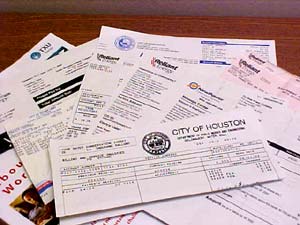Paying attention can get you some great laughs, memorable moments, or vital warnings. Yesterday I was driving behind a police car and noticed that he had a license plate border that said, “Actually, I prefer bagels.” I got a much needed laugh off of that one. Glad I was paying attention.
Most Americans are unaware at just how tenable the financial culture is in our nation right now. But seriously, to not know it is simply a matter of not paying attention. It’s not like we have to trust in some kind of a prophet to see for ourselves. There is a bounty of evidence right now that begs for our attention so that we can be prepared for an inevitable challenge. This evidence spells out the critical need for us to get our own homes in order so that we can survive through the looming financial crisis.
In 1962, the “Cuban crisis” suddenly left the grocery shelves of stores nationwide empty overnight. Yet there was plenty of warning ahead of time to those who were paying attention. These persons had the ability to be independent of panic and price gouging. Yet did anyone pay attention to a looming financial crisis a year in advance of the triggering incident?
Didn’t Americans wake up to what they thought was a routine day on December 7, 1941? Unfortunately there’s some evidence military didn’t pay attention to and we were tragically caught unaware.
While the “great depression” erupted in a matter of hours, its effects reached millions of Americans for years, in spite of numerous warning signs. Unfortunately, the indicators of today’s looming financial collapse are more rampant and indicate a much more severe collapse than that of 1929. Here are the reasons why I state as such.
1) Financial Crisis Clue #1: A new batch of over $12 billion (yes, that’s a “B”) of pay option arm mortgages are coming due this fall. We’ve seen how those due dates have affected the market thus far. With unemployment rising, finance restrictions getting tighter, and the mortgage market being so stale, this is NOT going to be a pleasant ride, folks.
2) Financial Crisis Clue #2: Flu outbreak. You do realize that one simple interruption in our nation’s transportation industry will cause a serious financial domino effect, right? There are over 250,000 trucking companies in the U.S. alone. The majority of them are “small businesses.” Just as you live hand to mouth, so do business owners. The trucking industry is no exception. We are due for quite the outbreak of this Swine flu this fall. I’ve never seen a more real potential for a quarantine in the last several decades as I do now. We’ve been warned of a possible quarantine as recent as the first of this month. I’m certain that the delays are being extended as long as possible holding out hope that it won’t be necessary due to the financial domino effect it will have. Other countries have begun some quarantine procedures, costing them over 5 billion dollars a day in lost commerce. I don’t think our economy is healthy enough to endure such a financial hit. The transportation industry is just the tip of the iceberg. Look at the effect a quarantine would have on everything else that doesn’t get paid as a result of consumers not being permitted to go to work. Then look at the businesses that could fail as a result of employees not being able to go to work. Look at the travel industry, hospitality, gasoline, groceries, utilities, credit, entertainment, etc. The cost of a quarantine on our nation would be immense and just by itself bring about a huge depression that would take us 7 years to recover from.
3) Financial Crisis Clue #3: Hyper inflation. This year the U.S. needs to sell the equivalent of 1.5 times its national deficit amount in the form of foreign investments in order to survive the present financial set back. Unfortunately, we’re almost into August and we haven’t succeeded at that yet. This year our deficit is “only” $1 trillion. However, next year it is $3 trillion. If we aren’t able to raise enough foreign investors for the $1 trillion this year, how are we to expect to raise 1.5 times our projected deficit for 2010—a process which USUALLY begins the quarter preceding the year the investments are needed? When hyperinflation occurs, the only solution is to raise taxes, print more money, or sell foreign bonds. They’ve already raised taxes. We aren’t being successful in selling the bonds. So, what happens if we print more money?
 4) Financial Crisis Clue #4: Currency value is highly questionable. As I’ve attempted to explain previously, national currency only has value in a fully functional economy. It only has value when there is a healthy balance between supply and demand. As we see in our news on a regular basis, we’ve long surpassed the criteria for a functional economy. I firmly believe our economy is as dysfunctional as Jon and Kate Gosselin’s marriage. Since the Federal Reserve refuses to publish the M3 report anymore which tells the American people just how much currency is in circulation at one time, we are seriously in store for an “emperor’s new clothes” scenario. The fact that we don’t know how much money is in circulation does not change the fact that we’re seeing significantly higher amounts of currency being exchanged than ever before. The reason why our government has been staking claim to so much land (in spite of the fact that it’s unconstitutional) is so that there is more “collateral” for our foreign bonds. Fort Knox is empty, folks. Even food commodities which we have had in store in abundance in decades past have been exported in desperation to bring cash flow into our country’s government. The clouds are getting awfully dark in this warning, folks.
4) Financial Crisis Clue #4: Currency value is highly questionable. As I’ve attempted to explain previously, national currency only has value in a fully functional economy. It only has value when there is a healthy balance between supply and demand. As we see in our news on a regular basis, we’ve long surpassed the criteria for a functional economy. I firmly believe our economy is as dysfunctional as Jon and Kate Gosselin’s marriage. Since the Federal Reserve refuses to publish the M3 report anymore which tells the American people just how much currency is in circulation at one time, we are seriously in store for an “emperor’s new clothes” scenario. The fact that we don’t know how much money is in circulation does not change the fact that we’re seeing significantly higher amounts of currency being exchanged than ever before. The reason why our government has been staking claim to so much land (in spite of the fact that it’s unconstitutional) is so that there is more “collateral” for our foreign bonds. Fort Knox is empty, folks. Even food commodities which we have had in store in abundance in decades past have been exported in desperation to bring cash flow into our country’s government. The clouds are getting awfully dark in this warning, folks.
5) Financial Crisis Clue #5: Credit crisis. Why in the world would credit card companies—who know full well that the economy is in serious trouble—start increasing minimum payment requirements to more than double the amount they’ve been in the past? What kind of financial sense does that make? Surely they will lose customers in doing so, or cause bankruptcies due to the irresponsible pool of consumers they cater to, right? So why would they make such a seemingly desperate move? It has to do with the fact that their money isn’t as valuable on the international trade markets any longer. As a result, the credit companies themselves have over extended themselves and thus have to cannibalize their source of income in order to bail themselves out. In addition, if you were to go to a grocery store consistently and find them out of milk each time, wouldn’t that start affecting your confidence in the availability of milk? You might start hoarding it when you did find it, or suspect there was a problem with it. The same is happening with money. Consumers are finding the “money shelves” bare at banks, credit companies, and lending companies. This directly affects consumer confidence so they are not parting with their “milk” quite so easily. Consumer confidence has a HUGE effect on currency value.
6) Financial Crisis Clue #6: Credit crisis affects power companies. Most power companies purchase their power in bulk. They are able to do so based on their credit ratings through contracts known as power purchase agreements (PPAs). However, as the credit crunch in our nation becomes more obvious, even power companies are losing their stellar credit ratings and thus have difficulty renewing power purchase agreements, or at the very least, negotiating the best prices. This means, of course, that the power costs are going to go up this fall when many of these agreements are up for renewal. Couple that with the Cap & Trade “TAX” and you have a recipe for yet another financial disaster. It could come to the point where an employee literally cannot afford to drive to work. Your utility costs could bankrupt you. If this type of domino effect occurs, not only would there be a financial collapse, but several utility companies could go bankrupt with no one and nothing to rescue them. Imagine a power company sitting there looking like a ghost town.
Well, I think that suffices for now, folks. My purpose in sharing this with you is to give you yet one more reason why those of you who are preparing for “something” AREN’T crazy, and why the rest of you need to wake up and take advantage of the good times to get ready now. It sure would be a shame if the times of plenty lulled us into a sense of numbness to common sense, wouldn’t it? My friends, I beg you to please wake up and pay attention to the looming financial crisis and prepare accordingly. When this occurs, currency will be useless. Items which have an inherent value to them such as food, medical supplies, fuel, etc. are the only thing that will be worthwhile. Right now you can still obtain such items with our questionable currency. But how long will that last? Is that really a gamble you’re willing to make on your family’s life?
Wake up and smell the currency folks. The financial collapse is indeed looming.
To see our upcoming event schedule, click here
Check out our inhome-course programs
Subscribe to Preparedness Pro today and never miss a thing!
For any questions or comments on this article, please leave a comment on the blog site so that everyone can benefit!
Copyright Protected 2009, Preparedness Pro and Kellene. All Rights Reserved. No portion of any content on this site may be duplicated, transferred, copied, or published without written permission from the author. However, you are welcome to provide a link to the content on your site or in your written works.




